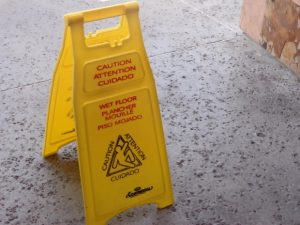Slip-and-Fall Injury Verdict Upheld After Court Finds Store Had Sufficient Notice of Hazard
 To prevail in a Florida slip-and-fall injury lawsuit, plaintiffs need to prove the business establishment had either actual or constructive notice of the hazardous condition, as outlined in F.S. 768.0755. Similar rules exist in other states, such as Wisconsin, where the state supreme court recently held there was sufficient evidence of constructive knowledge of a dangerous condition – even if the plaintiff could not prove exactly how long the slippery substance had been there.
To prevail in a Florida slip-and-fall injury lawsuit, plaintiffs need to prove the business establishment had either actual or constructive notice of the hazardous condition, as outlined in F.S. 768.0755. Similar rules exist in other states, such as Wisconsin, where the state supreme court recently held there was sufficient evidence of constructive knowledge of a dangerous condition – even if the plaintiff could not prove exactly how long the slippery substance had been there.
Before detailing what happened in this case, our South Florida slip-and-fall injury lawyers think it is important to explain the difference between actual and constructive knowledge in a premises liability case.
The actual notice requires evidence that a business was actually aware of a particular danger in that specific place and time. Constructive notice, meanwhile, requires presenting circumstantial evidence that shows:
- The hazard existed for such a period of time that the business should have learned about it were they exercising ordinary care.
- The hazard occurred so regularly it was foreseeable.
Plaintiff’s Proof Burden in Slip-and-Fall Cases
As reinforced by Florida’s 4th District Court of Appeal in the recent case of Oliver v. Winn-Dixie Store, Inc., the burden of proof to establish actual or constructive notice is on the plaintiff.
This was a case wherein failure to spot and clean up a squished grape in a grocery aisle was blamed for a slip-and-fall injury. Plaintiff conceded there was no evidence the store had actual notice of the grape or surrounding liquid on the floor. The only element relevant on appeal was whether the store had constructive knowledge of the grape. Video surveillance showed an employee, trained to be on the lookout for and immediately address debris on the floor, passing by the area four times in the half-hour before the plaintiff fell. There was no testimony of wheel tracks or other footprints through the grape smear either. The court held the plaintiff had not presented any other facts to suggest the grape and surrounding liquid was on the floor for such a length of time that it would have warned the defendant. The court affirmed case dismissal
Slip-and-Fall Injury Case Win
Notice is an essential element in any premises liability claim. Most slip-and-fall injury cases are won by establishing constructive, rather than actual, notice. Proving how long the dangerous condition existed can make-or-break a case. But that does not necessarily mean you need to show exactly when the condition started.
In the recent Wisconsin Supreme Court case of Correa v. Woodman’s Food Market, the plaintiff slipped on an unknown substance in the dairy aisle at the supermarket. To prove how long the substance had been on the floor, the plaintiff produced security camera video evidence showing the part of the store where he slipped and fell. All sides agreed the video did not show when or how the substance came to be on the floor. Still, they all agree the substance was there when the plaintiff fell (a store employee was brought over to clean up the spill and handed the plaintiff a paper towel to clean his shoe – all of this captured on surveillance video). The store insisted, though, it wasn’t aware there was an unsafe condition.
The state high court affirmed a verdict favoring the plaintiff, holding that, “plaintiff need not prove the exact moment an unsafe condition commenced, so long as the evidence is sufficient to prove it existed long enough to give the defendant constructive notice of its presence.” A jury could infer from the video footage that the unsafe condition had existed at least long enough to give the store constructive notice of its presence.
Florida slip-and-fall injury claims are more complicated than they might seem at first blush. It is imperative to work with an experienced South Florida injury lawyer who has a track record of successfully pursuing premises liability claims.
If you are injured in the greater South Florida area, contact our injury attorneys at the Garvin Injury Law at 800.977.7017 for a free initial consultation.
Additional Resources:
Oliver v. Winn-Dixie Store, Inc., Feb. 19, 2020, Florida’s 4th District Court of Appeals
Correa v. Woodman’s Food Market, May 19, 2020, Wisconsin Supreme Court





 Florida Personal Injury Lawyer Blog
Florida Personal Injury Lawyer Blog










